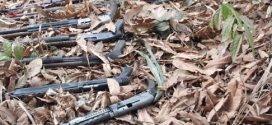 UNLESS members of the Economic Team of the Federal Government go back to the drawing board, the price of a bag of rice may soon go up.
UNLESS members of the Economic Team of the Federal Government go back to the drawing board, the price of a bag of rice may soon go up.
It was learnt, at the weekend, that a bag of rice may be sold for as high as N20,000 in some parts of the country. It is being sold for between N8,000 and N10,000 now.
This is because to encourage local production of the staple food, the Federal Government is proposing, in the 2013 Budget, a 10 per cent duty on imported rice and a 100% levy in addition to the duty. But the spate of flood in several parts of the country has wiped out thousands of acres of rice plantation.
Based on this, experts have warned, in reaction to the budget, that increased tariffs in the absence of adequate local production would lead to skyrocketing of rice prices, adding to the inflationary pressure already in place.
They are already calling on the government to review the proposed tariff structure with a view to maintaining sanity in rice prices for the average consumer of this staple product.
The Federal Government had declared that, as part of its agricultural transformation agenda to create 3.5 million jobs and drive diversification of the economy from oil, the country must become self-sufficient in rice production by 2015.
The plan is to replace imported brown rice and finished parboiled rice with locally-produced brown rice by 2013 and would, in 2015, observe absolute ban on rice importation.
To meet this target, government has already initiated the programme of producing hybrid rice.
In July alone, 315,000 metric tonnes of rice were imported through Lagos Ports alone. Hundreds of thousands of bags of rice were also suspected to have been smuggled in through land borders during the period.
The general belief now is that the spate of flood has sunk the country’s hope of rice self sufficiency, wrecking havoc in several states, destroying farmlands growing rice, maize and other crops.
This has led to the destruction of agricultural areas, prompting fears of imminent food security threats.
Minister of Environment, Hajia Hadiza Mailafia, confirmed this recently in Abuja while speaking with State House correspondents after the weekly Federal Executive Council (FEC) meeting.
She revealed that several thousand farmlands had been destroyed by the ravaging floods across the country, saying: “The consequences of the floods are that there are huge losses of farmlands, there are likely threats to food security, we are likely going to have challenges that have to do with the health of the people in some areas”.
In Kano State alone, thousands of hectares of farmlands have been destroyed by the flood, resulting in disruption to rice production.
In a statement by an association of rice growers in the state, rice farmers lamented that about 95 per cent of all rice farms have been destroyed by the floods that washed them away. According to the statement, the worst affected areas include Warawa, Doguwa, Wudil, Gabasawa, Ajingi and Gaya Local Governments. These, the statement noted, are the areas producing rice in large scale.
They predicted that prices of food stuff, especially rice and maize, would go up this year as a result of the disaster.
In Plateau State where the government says the flood that affected eight local government areas in the state had washed away eight bridges and rendered more than 10,000 people homeless, Abraham Yiljap, the state’s Commissioner for Information and Communication, said that more than 100 villages and 4,000 hectares of farmlands were destroyed.
The local governments include Kanam, Wase, Shendam, Lantang North, Lantang South, Mikang, Jos East and Jos North.
The commissioner said several crops had also been washed away by the disaster.
He also declared that the situation would lead to likely shortage of food supply in the state as the areas ravaged were mainly agricultural areas.
In Kwara State, over 3,200 hectares of rice plantation under the authority of Tada-Shonga Irrigation Scheme in Edu Local Government Area, have been washed away by flood.
 Hottestgistnaija.com
Hottestgistnaija.com




